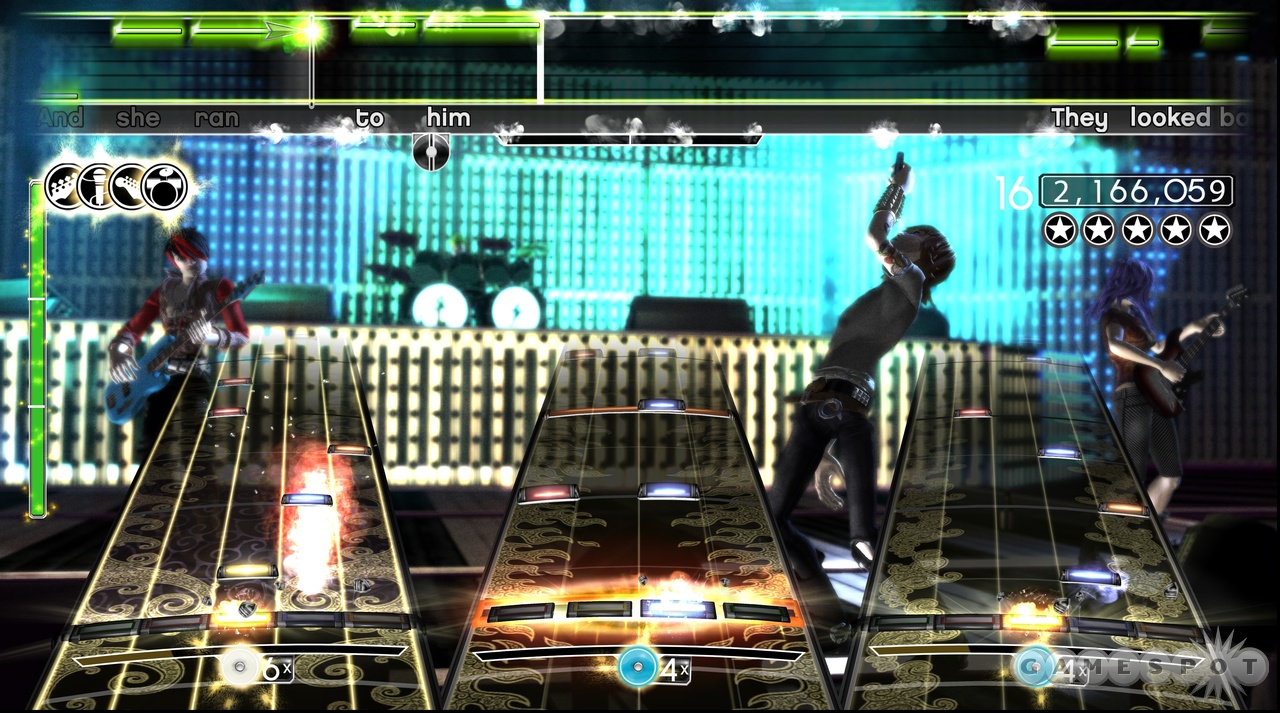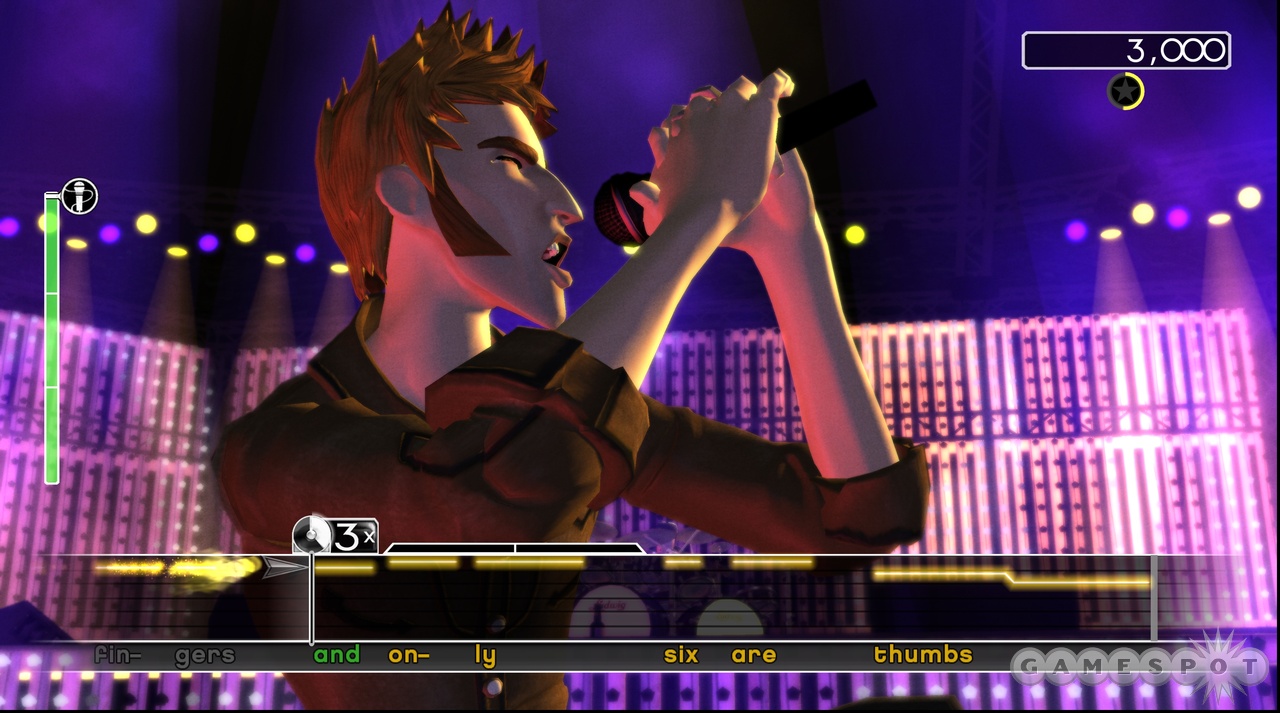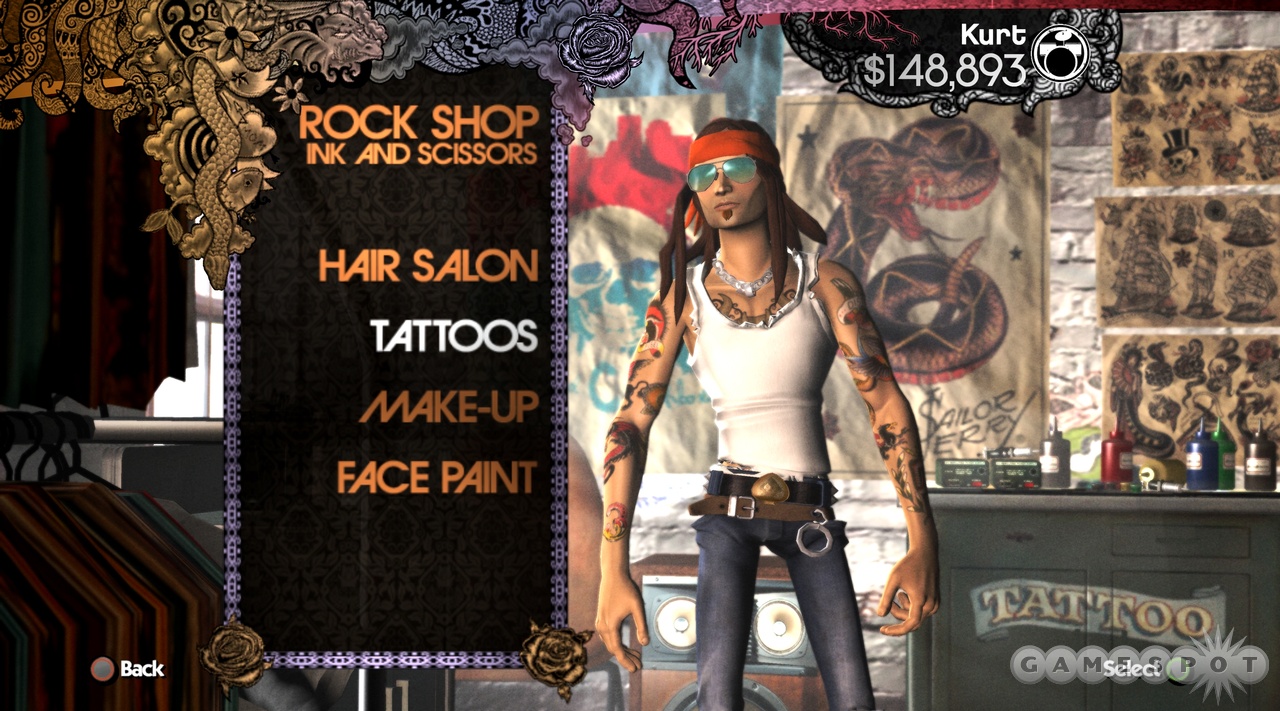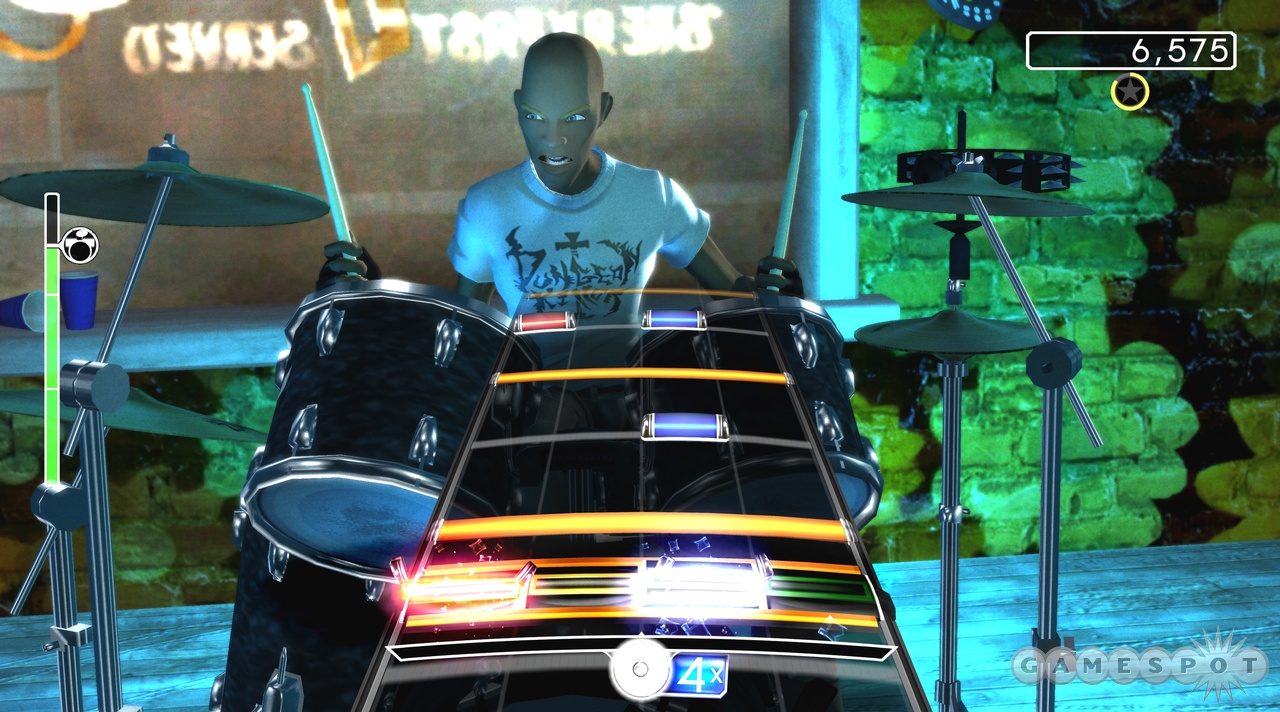Rock Band is every wannabe musician's dream. A game that takes the four key instruments one needs to make a band a rock band (guitar, bass, drums, vocals), and builds a highly playable and intensely addictive game around them. To a degree, developer Harmonix got a head start on the process of creating Rock Band when it developed the first two Guitar Hero games, but whereas those games were all about the decidedly solo act of severe simulated shredding, Rock Band goes in an entirely different direction. The solo play has taken a backseat to cooperative multiplayer. This game is all about the act of performance as a band, getting a group of four people together and working together to get the highest score bonuses possible as a group, all while fake guitaring and realistically singing and drumming your way through more than 40 different licensed rock hits. The steep $170 price tag for the game and bundled hardware might prove to be a barrier for entry for some, and in addition, the hardware itself comes with a few flaws. But if you're willing to make the investment, Rock Band is a guaranteed good time for any music lover, and one of the best party games you'll ever play.

In a sense, Rock Band is a little like three distinct games built into one. First, there's the guitar game, which lets you play approximately the same sort of game as Guitar Hero on guitar and bass, but with a few key differences. For one, the guitar itself is built quite differently from the Guitar Hero guitars. It's bigger, with a longer neck, and its body feels more solid. The fret buttons are larger, and are flush against the neck of the guitar, and there is a second set of narrower fret buttons all the way down the neck that you can tap on for solos. The guitar even comes with a built-in effects switcher, which puts effects like echo, flange, and wah-wah over the in-game guitar track. The only difference between guitars in the Xbox 360 and PlayStation 3 versions of the game is the fact that people who buy the 360 version get a wired guitar, whereas PS3 owners get a wireless one. On the flip side, PS3 owners don't get a USB hub to connect all the instruments to, whereas 360 owners do. That shouldn't be an issue if you have an older PS3, but if you have a newer one with the two USB ports, you'll need to buy one of those hubs separately. It's also worth noting that you only get one guitar with the bundle on either platform, but if you own a Guitar Hero guitar for the 360, you can use it with the 360 version of Rock Band.
The actual guitar gameplay isn't much different from Guitar Hero, with you strumming along and periodically tilting the guitar to engage "overdrive" (the game's equivalent of star power), but a couple of neat twists do add some flavor. For one thing, solos are given their own scoring section in each song, and the game tracks the percentage of notes hit during a solo. The higher the percentage, the higher the score bonus you get at the end of the solo.
The guitar game is of good quality, though a couple of things about it might drive a few longtime Guitar Hero fans batty. For one, the difficulty of the game is a good deal less challenging than what the hardcore Guitar Hero fan base is probably accustomed to at this point. The goal with Rock Band seems to be more about bringing in newcomers, so as a result, the difficulty level sits somewhere between Guitar Hero and Guitar Hero II overall. Not a bad thing if Guitar Hero III gave you conniption fits, but potentially less exciting for some of the hardcore guitar gamers out there. Also of note is that the note charts for guitar are handled a bit differently, with notes that can be pulled off via hammer-ons and pull-offs appearing as half-sized notes on the chart. It's not quite as easy to see these notes as in, say, Guitar Hero III, so you might end up screwing up a few solos until you get used to this new methodology.
Lastly is the guitar itself. It's a good guitar, but it does some things differently than the standard GH model guitars. The strummer doesn't click when you strum up or down, and the fret buttons seem a bit less forgiving in terms of timing in solos and other, tougher sections. It's not that it's bad or wrong--it's just different, and it takes some getting used to. Also, you're not going to get a ton of mileage out of things like the second set of buttons and the effects switch. Most people will probably forget the switch is even there until they accidentally turn on wah-wah, and sliding down to the second button set is a bit vexing to do just as you're about to head straight into a solo, since it takes a while to get accustomed both to the smaller buttons and to finding exactly where they are on the neck without staring at the guitar for a few seconds. Fake-guitar virtuosos will probably dig it, but most people will likely stick to the standard method.
Next there's the singing game, which closely emulates the mechanics of Karaoke Revolution and SingStar, but, again, with a couple of specific differences. You sing along as the lyrics display on the screen, trying to match your vocal pitch to the meter that moves up and down with the original vocal track. The key thing about singing is that the number of sections where a singer actually gets to do his or her thing is somewhat limited. But even those down moments aren't left for pure silence. Sometimes the vocal area of the screen will turn yellow, indicating for you to "make some noise," which then engages overdrive. There are also sections where you can simply tap the microphone to the rhythm of the song to get a tambourine or cowbell section going.

Beyond these wrinkles, the core of the vocal game design is to just sing, sing, sing...and occasionally rap. If there is any complaint to be made about the vocals, it's that it doesn't leave a lot of room for interpretation. On the higher difficulty settings, the game is extremely intent on you hitting the mapped pitches as closely as possible, even in situations where it seems like the mapped pitches aren't quite exact to what the original vocalist is doing. The same goes for the timing of each word. In some songs vocalists will trail off, but you can't really do that and still get the max score, which makes the vocals feel a bit robotic. Still, most vocal pieces are quite fun regardless, and in a nice touch to help middling vocalists everywhere, you can adjust the original vocal track volume via the controller as you play, so you can use it for as much or as little of a guide as you prefer.
Finally there are the drums, easily the most intense and enjoyable instrument of the bunch. The kit consists of a collection of four color-coded pads and a kick pedal, along with a pair of drum sticks. There's really no reference point for the drums portion of the game except for, well, real drums. You hit the pads in time as you would with a realistic drum kit, and on expert, the game practically maps out each song's drum part note for note. Make no mistake: When you are playing on expert, you are playing the drums. If you can do well on expert, you can probably pull out a decent beat on a real drum set at will. The good news for novices is that easy difficulty does a pretty good job of easing you into the act of drumming. The number of notes is much more limited, kick pedal usage is rare, and drum fills are eased back quite a bit.
Speaking of fills, one really cool thing about the drum portion of the game is that it allows for some improvisation. The way the drums handle overdrive is to give you some blocked-out sections where you can just bust out any kind of drum fill you want. The pads act as a snare, two tom-toms, and a crash cymbal. Go nuts, but just be sure you hit the last crash cymbal note at the end of the fill, at which point you will engage overdrive.
If there is any issue to be taken with the game's hardware, it's its reliability. For instance, one of our pre-release kick pedals from the drum kit, which is made up of a somewhat thin piece of plastic hooked into a spring underneath it, actually snapped in half during a particularly heated rendition of The Who's "Won't Get Fooled Again." The other pedals we used for testing held up despite some extreme thrashing, but all the same, our suggestion is that if you've got a Mr. Heavyfoot in your band, tell them to go shoeless and ease up on the pedal slammage a smidge. Another issue is the USB microphone. One of our retail boxes came with a broken mic that cut in and out and wouldn't register our vocals properly. Any supported USB headset mic will apparently work in a pinch on the PS3, and the standard Xbox 360 headset works on there as well, but regardless, that's still a concerning issue. At least EA seems to be aware of potential hardware issues, as a big flyer inside the box explains the 60 day hardware warranty that comes with the game and directs you to an EA Web site. You might want to keep that URL handy if you run into any issues.
Those are all the technicals of the instrumental gameplay, but none of that quite emphasizes how excellent the game is at emulating the act of band play. By themselves, each instrument is basically fun, but when you get four people together playing at once, something spectacular emerges. Part of it is the way in which scoring has been designed for cooperative play. Overdrive can be turned on by anyone, but the more people you have in overdrive at once, the higher the score bonuses. By the same token, if one person in your band fails out of a song, another can simply engage overdrive (provided enough is stored up at that point) and come to the rescue, bringing the player back into the fold. But it goes beyond even the scoring mechanics. There's just something intangibly brilliant about the way having everyone play together feels. For instance, because the drums emulate the real-life instrument so closely, having a good drummer is paramount for success. If your drummer gets off beat, it can badly screw everyone up. Along the same lines, when your drummer is in a solid groove and the rest of the band is able to lock into that groove, the feeling that you're actually performing a song as opposed to simulating one is palpable, and it is quite the exhilarating feeling.

The game's song list goes a long way toward making that multiplayer even more enjoyable. Though the game includes only 45 licensed songs (along with 13 bonus tracks from lesser-known bands), many of these 45 are big-name tracks that are immediately recognizable and span multiple rock genres. Alternative rock fans will find such '90s delights as Weezer's "Say It Ain't So," Smashing Pumpkins' "Cherub Rock," and Nirvana's "In Bloom." Modern rockers will find The Killers' "When You Were Young," Foo Fighters' "Learn to Fly," and Yeah Yeah Yeahs' "Maps." Classic rock fans will delight in being able to rock their way through Black Sabbath's "Paranoid," The Rolling Stones' "Gimme Shelter," and KISS's "Detroit Rock City." Other, less specifically denominational yet altogether awesome songs include The Ramones' "Blitzkrieg Bop," Rush's "Tom Sawyer," and Metallica's "Enter Sandman."
The vast majority of these songs are original tracks from the artists, with only a few covers scattered throughout the tracklist. Only a few of the covers really stick out much. The Geddy Lee on "Tom Sawyer" is a bit overblown, and the singer of Mountain's "Mississippi Queen" is a bit odd sounding as well. But by and large, the covers blend in nicely, and whoever did the vocals for Steven Tyler and Bruce Dickinson on the Aerosmith and Iron Maiden songs respectively deserve some kind of vocalist soundalike merit badge.
The only real problem with the tracklist is that some of the songs aren't the kind of immediately recognizable stuff you would expect in a game that's all about a bunch of people getting together and making elaborate band karaoke. Quick, off the top of your head, immediately think up the melody to The Police's "Next to You," or Molly Hatchet's "Flirtin' With Disaster." None of these songs are unpleasant to play or anything, but they don't quite fit into the scheme of songs anyone can just pick up and rock to, especially on vocals. Heck, just about anyone can probably whine their way through "Cherub Rock" or snarl through "Enter Sandman" on the lower difficulty levels. But Aerosmith's "Train Kept a Rollin'"? Maybe not so much, but perhaps that just depends on you and your friends' personal tastes in music.
Clearly Rock Band's focus and ultimate strength is as a multiplayer game, specifically a cooperative one. This is also evidenced by the game's somewhat less captivating single-player element, at least compared with its multiplayer game. You can play solo in quick play, or in one of the three solo career modes, one for guitar, one for vocals, and one for drums. These all follow the basic formula laid down by Guitar Hero, with tiers that unlock in order of increasing difficulty. One nice thing is that each instrument's career offers a totally different track order, scaled to the difficulty for that specific instrument. The other cool thing is the fact that you can customize your own rocker for each instrument. You start out with some basic edits, and then as you go, the cash you earn in the career mode lets you buy all sorts of wicked rock garb, tattoos, haircuts, and the like. But as far as the progression of the career itself is concerned, it's pretty boilerplate. Nothing of note really happens during the course of the career, and it ultimately lacks the dynamism of the band world tour mode.

Band world tour is the co-op career mode. Two to four players can create their own rockers and start rocking right away, and band members can jump in or drop out at any time, so long as the profile of the band founder is always signed in and playing. The mode is essentially a much more fleshed-out version of the same sort of tiered career mode as the solo tour. You start out as a nobody band, playing the teensiest club in your hometown. As you play gigs and perform well, you'll earn more fans, which helps propel your band ever forward toward rock stardom. You also earn stars in each gig, and the more stars you collect, the more gigs that will unlock in each available city.
This mode is, in a word, addictive. Working to gather as many fans and stars as you can becomes almost compulsive after a while. If you've got friends with you willing to stick it out, you could potentially lose a lot of hours of your life touring the world. Another thing that makes band world tour so cool is the presentation of it all. As you grow your fan base, you'll earn the opportunity to get a crappy van, then a tour bus, and even a jet. You'll have the chance to win another band's roadies, hire a sound guy, get signed to a label, and eventually work your way into the hall of fame. It's an awesome experience, to be sure.
The mode itself never actually ends, letting you continue to earn fans and keep playing gigs, though after a while you will forced into the higher difficulty settings, which potentially spells trouble if you start running into songs you don't really know yet, and you eventually start to run into a fair amount of song repetition, especially if you haven't already unlocked all the game's songs in the solo tour. Starting out fresh guarantees you'll be playing a lot of the same songs again and again from the very beginning. If you unlock everything in solo, the tour opens up a great deal. While 58 songs might seem like a lot to pick from, you're still going to end up repeating songs a fair amount, especially when you do the special challenges, which automatically pick random songs for you.
It is perhaps a good thing, then, that Rock Band is supported with lots of downloadable content. Several song packs (including artist packs for bands like Queens of the Stone Age and Metallica), single-song downloads, and full-album downloads (The Who's "Who's Next" will be the first) have been announced thus far. Pricing on these songs is slightly cheaper than the Guitar Hero song packs, but not so much cheaper that you won't notice the hurt on your wallet if you start splurging for every song that comes along. Still, the idea of getting regular downloadable content is great (Harmonix and MTV are apparently going to start out by releasing songs on a weekly schedule), and the full-album download idea is awesome. Even better, any song you download makes its way into the rotation in the band world tour, which should alleviate some of the repetition over the long haul.
The one truly unfortunate thing about the band world tour mode is that it isn't online. That might be a dicey prospect for those without regularly available friends with a similar love of music games. The good news is that there is an online co-op quick play option, so if you and your buddies just want to get together and play single songs as a band for fun and high scores, you can. The online also includes competitive options, such as a basic score duel (same instrument, same difficulty, play the entire song) and a tug-of-war mode (same instrument, any difficulty level, trade off sections of the song, try to win the crowd over to your side by performing the best). These modes are about as enjoyable as Guitar Hero III's online component, so if you dug that stuff, you'll definitely dig this. The online modes also performed well across the board, with no noticeable lag while playing.
Perhaps one of the best things about Rock Band is its presentation. The in-game visuals are of very high quality, with great character modeling, top-notch animation work on each musician, and lots of neat lighting and visual effects during the course of the performance. And the best thing about all of that? None of it causes the game to slow down whatsoever. The note charts stay steady no matter how much craziness is going on in the background. If there's any flaw to be found in the visuals at all, it's that the notes on the note charts are a little on the small side. It's not a big deal in one- or two-player play, but when you have both guitars and drums going at once, it can sometimes be tough to make out whether you've hit a note or not. Also, if you're trying to figure out which version of the game to get, visuals won't make much difference. Both the Xbox 360 and PS3 versions of the game look pretty much identical to one another.

The presentational quality goes well beyond the visuals. Everything about Rock Band just feels authentic. It's the little details, like how some arenas will put your band's name in big lights behind you on stage, or how when you're performing well the crowd will start singing along with the vocalist. Awesome stuff. Heck, even the game's loading screens are cool, offering up some neat band trivia, as well as dynamically generated band photos featuring your created musicians in a variety of delightfully exaggerated rock poses.
All told, Rock Band turns in an absolutely stellar performance. And much like any real band worth its salt, it's not just because of one or two things that it does well while the rest fall by the wayside. Each individual component of the game is good on its own, but it's when you put those things together into a collective whole that the game truly shines. Ultimately, the $170 investment is bound to be a sticking point for some, especially those who don't have readily available friends who can come over and rock whenever the itch needs to be scratched. But even with that caveat in mind, Rock Band is easily one of the most ambitious music games ever produced, and that it is so successful in its ambition makes it something really special.